社会工作-生态系统理论视角下农村留守儿童问题研究论文
生态系统理论视角下社会工作介入农村留守儿童家庭教育的应用研究以S小学为例

2、小组工作:小组工作是一种有效的社会工作方法,能够促进留守儿童的 相互支持和成长。在S小学的实践中,社会工作者组织了多个小组活动,如兴趣 小组、成长小组等。通过这些活动,留守儿童能够结交更多的朋友,分享彼此的 喜怒哀乐,共同成长进步。
社会工作介入农村留守儿童家庭教育,旨在弥补家庭教育缺失带来的负面影 响。具体而言,社会工作可以通过以下途径介入:
1、提供心理支持:社会工作者可以为留守儿童提供心理支持和辅导,帮助 他们建立自信、积极面对生活中的挑战。
2、链接资源:社会工作者可以协助留守儿童获得更好的教育资源,如争取 教育补贴、优秀教师资源等。
随着中国社会经济的快速发展,大量农村劳动力涌向城市,农村留守儿童数 量不断增加。这一现象给农村家庭教育带来了严峻的挑战,许多留守儿童面临着 家庭教育的缺失。本次演示以辛冲镇留守儿童为例,探讨农村留守儿童家庭教育 的缺失及社会工作介入,以期为解决农村留守儿童家庭教育问题提供参考。
家庭教育的缺失
农村留守儿童家庭教育缺失的原因是多方面的。首先,父母长期外出务工, 无法在身边陪伴孩子,导致家庭教育的缺位。其次,受经济条件限制,许多农村 家庭无法将孩子带入城市接受更好的教育。此外,部分家长对家庭教育的重要性 认识不足,缺乏教育意识和知识也是家庭教育缺失的重要原因。
研究方法
本研究采用问卷调查和访谈相结合的方法进行。首先,通过问卷调查了解农 村留守儿童家庭教育的现状及其影响因素;其次,进行访谈,了解社会工作介入 后农村留守儿童家庭教育的改善情况及相关方的看法。
社会工作留守儿童相关论文

社会工作留守儿童相关论文社会工作与留守儿童的关系在当今社会中,留守儿童问题日益突出,成为了亟待解决的社会问题。
留守儿童指的是由于父母长期外出务工或其他原因,无法与父母保持长时间亲密陪伴的儿童。
这一问题不仅对儿童的身心健康造成了严重影响,同时也对社会稳定和健康发展构成了潜在威胁。
为了解决留守儿童问题,社会工作发挥了重要作用,并逐渐成为了解决这一问题的重要力量。
首先,社会工作在保障留守儿童权益方面发挥着至关重要的作用。
由于父母长期不在身边,留守儿童常常面临着权益保障的困境。
社会工作者通过了解和宣传留守儿童的权益,帮助他们了解自己的权利,并向社会倡导为留守儿童提供平等的教育、医疗和生活保障。
此外,社会工作还通过制定相关政策和法律,加强对留守儿童权益的保护和监督,确保他们能够健康成长。
其次,社会工作在提供专业支持方面对留守儿童起到了积极的作用。
留守儿童由于长期缺乏父母的陪伴和指导,容易在心理、学习和行为等方面出现问题。
社会工作者与学校、社区以及相关机构合作,提供心理咨询、学习辅导和行为训练等多方面的专业支持,帮助留守儿童克服困境,提高他们的自信心和适应能力,促进他们的全面发展。
此外,社会工作还在促进家庭关系方面发挥着重要作用。
留守儿童由于缺乏家庭的关爱和陪伴,常常在成长过程中感到孤独和无助。
社会工作通过与父母和监护人的沟通和协调,促进他们对孩子的关注和照顾,并提供家庭指导和教育支持,帮助他们建立健康的亲子关系,增进家庭对留守儿童的理解和支持,从而提升留守儿童的幸福感和安全感。
最后,社会工作还在社区支持方面对留守儿童发挥了重要作用。
社区是留守儿童生活的重要环境,而社会工作通过与社区居民、志愿者和相关组织合作,为留守儿童提供各种形式的支持和服务,如社区活动、课后辅导和兴趣培养等,使留守儿童能够更好地融入社区,与他人建立良好的人际关系,增加他们的社会参与度和社会支持网络。
综上所述,社会工作在解决留守儿童问题上发挥了重要作用。
社会工作视角关注留守儿童问题论文

社会工作视角关注留守儿童问题探究【摘要】农村留守儿童问题是我国社会转型时期不可回避的一个重大问题。
本文为解决农村留守儿童问题提供参考,有利于农村教育的均衡发展和和谐农村社会的构建。
社会工作是促进留守儿童问题解决的有效途径之一。
本文在了解留守儿童问题及其现实状况的基础上,以社会工作理念为指导,研究怎样应用社会工作方式、方法促进留守儿童问题的解决,具有一定的理论意义和现实意义。
【关键词】留守儿童问题;社会工作;介入随着社会经济的快速发展,大量农村青壮年剩余劳动力进城打工,在农村就有了这样一个特殊的群体——留守儿童。
农民父母双方或一方为了生计外出打工,用辛劳获取家庭收入,为经济和社会发展作出了贡献,但他们的孩子却留在了农村家里,与父母相伴的时间微乎其微,亲情的缺失使留守儿童在自身发展过程中遇到了一定的障碍。
在这种大背景下,社会工作介入留守儿童,帮助解决留守儿童问题有其必要性和可行性。
一、留守儿童出现的问题留守儿童问题如今俨然已成为了一个社会问题。
留守儿童正处在青少年身心发展、性格形成、知识积累的关键时期。
由于缺少父母关爱,留守儿童出现了很多问题。
(1)心理健康方面的问题。
由于留守儿童远离父母,缺少与父母沟通交流的机会,而监护人又无暇顾及他们的心理情感变化,这对留守子女的心理发展非常不利,常常引发种种心理病症,如感情脆弱、自暴自弃、焦虑自闭、缺乏自信、悲观消极。
(2)学习成绩方面的问题。
留守儿童的学习成绩较差,这是由多方面原因导致的。
首先,留守儿童的学习动机和学习兴趣不足,学习的自觉性和自律性较差,有厌学和逃课的倾向。
其次,由于留守儿童的直接监护人不在身边,留守儿童的学习一般是由间接监护人(如祖父母等)辅导与监护的。
而这些人大多是年龄较大,精力不足,对留守儿童的学习监督也力不从心。
最后,学校对留守儿童的学习与生活的关注力度也不够,教师与校方只在有限的学校或上课时间内对其管理与教育。
(3)生活行为方面的问题。
社会工作视角下农村“留守儿童”问题的分析与对策

社会工作视角下农村“留守儿童”问题的分析与对策一、本文概述本文旨在从社会工作的视角出发,深入分析和探讨农村“留守儿童”问题,并提出相应的解决策略。
留守儿童,指的是因父母长期外出打工或离异等原因,而被留在农村老家生活的儿童。
这一群体在中国社会中占据了一定的比例,尤其在农村地区更为突出。
他们面临的困境和挑战,如教育问题、心理健康问题、生活照顾不足等,已引起社会的广泛关注。
本文首先对农村留守儿童问题的现状进行了概述,包括留守儿童的数量、分布、主要面临的问题等。
接着,从社会工作的角度出发,分析了导致留守儿童问题的深层次原因,如城乡发展不平衡、家庭结构变化、教育资源分配不均等。
在此基础上,本文进一步探讨了社会工作在解决留守儿童问题中的独特作用,如提供心理支持、优化教育资源、促进家庭沟通等。
本文提出了针对农村留守儿童问题的具体对策和建议。
这些对策旨在从政策、家庭、学校、社区等多个层面出发,为留守儿童创造更好的生活和学习环境,帮助他们健康成长。
通过本文的研究,希望能够为社会工作在解决农村留守儿童问题中提供有益的参考和借鉴。
二、农村留守儿童问题的现状分析农村留守儿童问题,作为当前社会转型期的一个突出社会问题,其现状呈现出复杂性、多元性和紧迫性。
从社会工作的视角来看,留守儿童面临的问题主要集中在以下几个方面。
留守儿童普遍面临亲情缺失的困境。
由于父母长期在外务工,留守儿童与父母的沟通和交流机会大大减少,这导致他们在情感上缺乏支持和安慰。
长期缺乏亲情陪伴,留守儿童容易产生孤独感、焦虑感,甚至产生自卑心理,对其健康成长造成不利影响。
留守儿童的教育问题也亟待关注。
由于农村教育资源相对匮乏,留守儿童的受教育机会和质量都受到一定程度的影响。
同时,由于家庭教育的缺失,留守儿童的自律性和学习习惯较差,导致学习成绩普遍偏低。
这不仅影响他们的未来发展,也增加了社会的不稳定因素。
再次,留守儿童在生活照料和安全保护方面也存在诸多问题。
由于缺乏父母的直接监护,留守儿童在生活自理能力和安全防范意识上相对较弱。
社会工作留守儿童相关论文
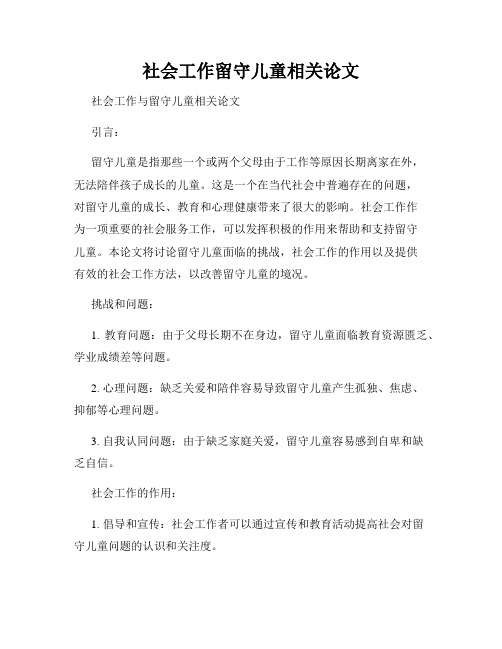
社会工作留守儿童相关论文社会工作与留守儿童相关论文引言:留守儿童是指那些一个或两个父母由于工作等原因长期离家在外,无法陪伴孩子成长的儿童。
这是一个在当代社会中普遍存在的问题,对留守儿童的成长、教育和心理健康带来了很大的影响。
社会工作作为一项重要的社会服务工作,可以发挥积极的作用来帮助和支持留守儿童。
本论文将讨论留守儿童面临的挑战,社会工作的作用以及提供有效的社会工作方法,以改善留守儿童的境况。
挑战和问题:1. 教育问题:由于父母长期不在身边,留守儿童面临教育资源匮乏、学业成绩差等问题。
2. 心理问题:缺乏关爱和陪伴容易导致留守儿童产生孤独、焦虑、抑郁等心理问题。
3. 自我认同问题:由于缺乏家庭关爱,留守儿童容易感到自卑和缺乏自信。
社会工作的作用:1. 倡导和宣传:社会工作者可以通过宣传和教育活动提高社会对留守儿童问题的认识和关注度。
2. 政策倡导:社会工作者可以参与政策制定和倡导,争取更多的资源用于解决留守儿童问题。
3. 个案工作:社会工作者可以与留守儿童建立信任和支持关系,提供情感上的支持和帮助。
4. 家庭支持:社会工作者可以与留守儿童的父母进行沟通,提供家庭支持和资源,帮助他们更好地照顾孩子。
社会工作方法:1. 集体活动:社会工作者可以组织留守儿童参与集体活动,增强他们的社交能力和自信心。
2. 心理咨询:社会工作者可以提供心理咨询和支持,帮助留守儿童应对心理问题和压力。
3. 学业支持:社会工作者可以与学校合作,提供学习辅导和支持,促进留守儿童的学业发展。
4. 社区合作:社会工作者可以与社区机构和志愿者合作,共同解决留守儿童面临的问题。
结论:社会工作在解决留守儿童问题方面发挥着重要作用。
通过倡导、个案工作、家庭支持和社区合作,社会工作者可以帮助留守儿童克服教育、心理和自我认同等问题,提升他们的生活质量和发展潜力。
然而,留守儿童问题的根源仍然是家庭缺乏关爱和陪伴,社会工作需要与其他领域合作,共同努力,为留守儿童提供更好的成长环境和机会。
社会工作介入农村留守儿童问题浅议
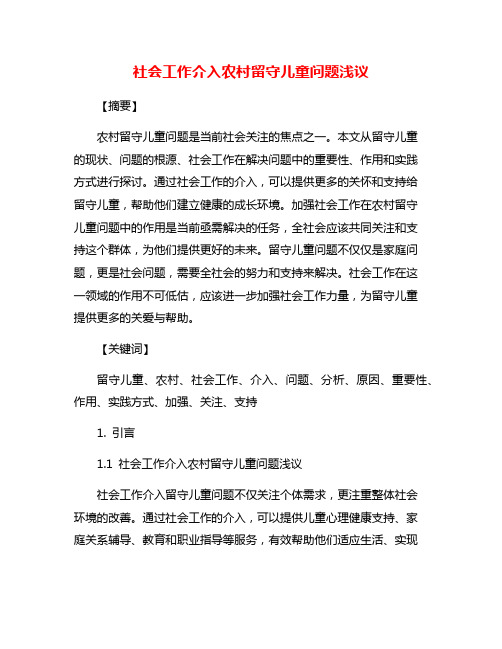
社会工作介入农村留守儿童问题浅议【摘要】农村留守儿童问题是当前社会关注的焦点之一。
本文从留守儿童的现状、问题的根源、社会工作在解决问题中的重要性、作用和实践方式进行探讨。
通过社会工作的介入,可以提供更多的关怀和支持给留守儿童,帮助他们建立健康的成长环境。
加强社会工作在农村留守儿童问题中的作用是当前亟需解决的任务,全社会应该共同关注和支持这个群体,为他们提供更好的未来。
留守儿童问题不仅仅是家庭问题,更是社会问题,需要全社会的努力和支持来解决。
社会工作在这一领域的作用不可低估,应该进一步加强社会工作力量,为留守儿童提供更多的关爱与帮助。
【关键词】留守儿童、农村、社会工作、介入、问题、分析、原因、重要性、作用、实践方式、加强、关注、支持1. 引言1.1 社会工作介入农村留守儿童问题浅议社会工作介入留守儿童问题不仅关注个体需求,更注重整体社会环境的改善。
通过社会工作的介入,可以提供儿童心理健康支持、家庭关系辅导、教育和职业指导等服务,有效帮助他们适应生活、实现自我价值。
社会工作还可以引导社区资源共享、促进家庭和社区的互助合作,建立起一个更加有利于留守儿童成长的环境。
在深入了解留守儿童问题的社会工作也需要不断探索更加有效的实践方式。
只有结合实际情况,注重个体需求,才能真正做到有效帮助。
社会工作介入留守儿童问题的过程中,需要借助各种资源和手段,包括社会工作者、志愿者、政府支持等,共同努力解决这一社会难题。
社会工作介入农村留守儿童问题有着重要意义和作用。
只有加强社会工作在这一领域的作用,全社会共同关注和支持,才能帮助留守儿童更好地成长,建设和谐、健康的社会环境。
2. 正文2.1 留守儿童现状分析留守儿童指因父母长期外出务工、迁移等原因而留在农村家乡由亲属或其他成年人照料的儿童。
留守儿童是一群特殊的群体,他们通常面临着缺乏父母关爱、教育资源匮乏、心理健康问题等诸多困境。
留守儿童普遍存在心理问题。
由于长期与父母分离,留守儿童缺乏陪伴和关爱,容易导致孤独、焦虑、抑郁等心理问题。
农村留守儿童论文(3篇)

农村留守儿童论文(3篇)第一篇:农村留守儿童学校社会工作探析一、留守儿童的基本情况通过统计,该校有94名留守儿童,他们来自各个年级,年龄主要分布在6到12岁的学龄期。
其中,女生51名,男生43名,父母主要在武汉、广州、深圳等地务工,最短一周、最长一年回来探望一次。
除少数几个托付给邻居或者亲戚照看的儿童以外,多数的儿童由爷爷奶奶照看。
由于较长时间和父母的疏离,这些留守儿童所表现出的依恋类型也不相同,总体上体现出,年龄较小的儿童依恋程度较高,年龄较大的儿童依恋程度较低甚至有一些由于依恋缺失产生了较轻的心理问题。
留守儿童对外界的好奇心较重,在最初的接触中,对陌生人警惕性较高,建立良好的专业关系以后,他们对社会工作人员的依恋程度较高,希望从我们这得到关爱的需求度明显提高。
除了由亲戚或者邻居照看的高年级儿童住在学校里,大多数的留守儿童都住在家里,且离学校的距离都不太远。
处于学龄期的儿童,通过顺利地完成学习课程,获得勤奋感,从而形成自信心。
刘德才与刘德志为9岁和11岁的弟兄俩,父母双双外出打工,他们每天早上7点起来结伴步行15分钟去学校,中午在学校和大家一起吃饭,晚上6点半左右到家,干一点农活,然后和爷爷奶奶一起吃饭,写作业。
他们的父母一般一个星期会打一次电话回来问家里情况,在电话中教导子女学习和生活的事情。
类似这样的孩子有很多,他们有强烈的学习意识,独立自主能力强,但学习成绩差,注意力集中水平较低,学习自主性和自我监督能力不强。
在生活方面,他们缺乏父母的教导与关爱,自理能力强,但情感需求强烈,容易出现冷漠、烦躁、情绪反应略微迟钝等问题。
二、留守儿童出现的问题1.学习问题该小学留守儿童总体上成绩较差。
这主要有两方面的原因。
一是由于父母长期不在身边,对孩子的学习疏于监督,使许多孩子自学习方面处于一种无人问津的状况,久而久之,使孩子对学习产生了一种无所谓的态度。
二是和留守老人一起生活的留守儿童,在学习之余,还要帮助老人做一些家务劳动。
社会工作视角下的留守儿童问题及对策研究
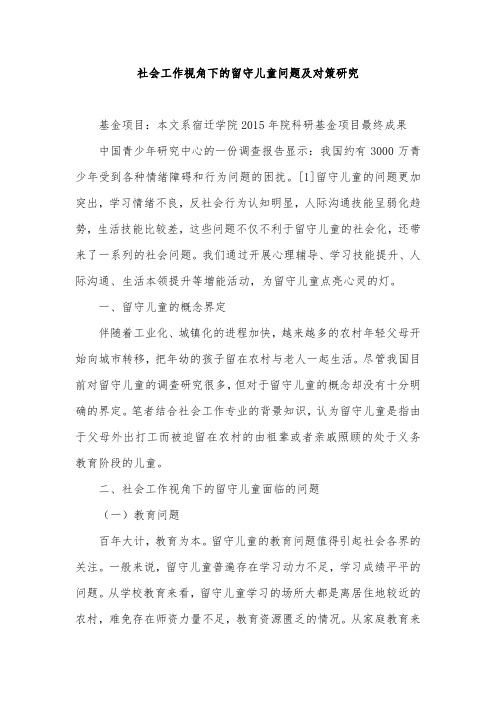
社会工作视角下的留守儿童问题及对策研究基金项目:本文系宿迁学院2015年院科研基金项目最终成果中国青少年研究中心的一份调查报告显示:我国约有3000万青少年受到各种情绪障碍和行为问题的困扰。
[1]留守儿童的问题更加突出,学习情绪不良,反社会行为认知明显,人际沟通技能呈弱化趋势,生活技能比较差,这些问题不仅不利于留守儿童的社会化,还带来了一系列的社会问题。
我们通过开展心理辅导、学习技能提升、人际沟通、生活本领提升等增能活动,为留守儿童点亮心灵的灯。
一、留守儿童的概念界定伴随着工业化、城镇化的进程加快,越来越多的农村年轻父母开始向城市转移,把年幼的孩子留在农村与老人一起生活。
尽管我国目前对留守儿童的调查研究很多,但对于留守儿童的概念却没有十分明确的界定。
笔者结合社会工作专业的背景知识,认为留守儿童是指由于父母外出打工而被迫留在农村的由祖辈或者亲戚照顾的处于义务教育阶段的儿童。
二、社会工作视角下的留守儿童面临的问题(一)教育问题百年大计,教育为本。
留守儿童的教育问题值得引起社会各界的关注。
一般来说,留守儿童普遍存在学习动力不足,学习成绩平平的问题。
从学校教育来看,留守儿童学习的场所大都是离居住地较近的农村,难免存在师资力量不足,教育资源匮乏的情况。
从家庭教育来看,留守儿童大都是与祖父母一起生活,而祖父母由于自身年迈,文化程度不高,不能够对孩子的学习提供全面有效的指导与监督,导致留守儿童不把学习放在心上,缺乏学习兴趣,对待学习任务草草了之等。
(二)心理问题家庭环境是影响孩子人格发展的重要场所,父母的教育方式是影响孩子性格形成的重要因素。
留守儿童正处在生理和心理发育的重要时期,在认知、学习、行为和人际交往中会遇到许多问题,较突出地表现为自卑心理、学习压力大、情绪不稳定、人际关系紧张等,他们非常渴望得到父母的关爱与呵护。
可父母常年外出工作,祖辈对留守儿童的照顾一般只停留在保证孩子生命安全,满足吃饱穿暖,却忽视孩子的内心世界。
社会工作 留守儿童 论文
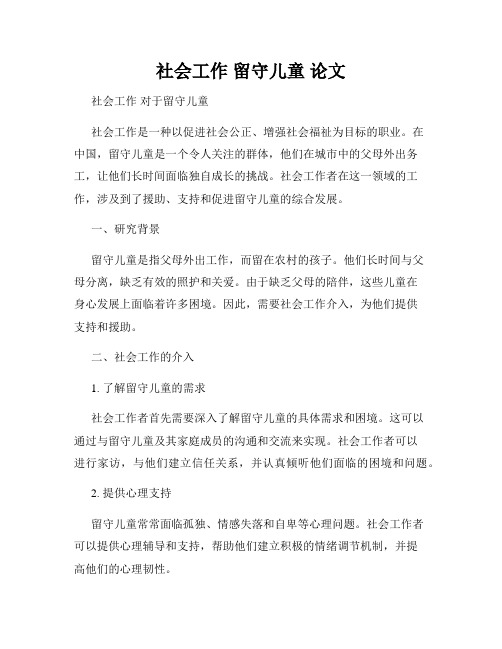
社会工作留守儿童论文社会工作对于留守儿童社会工作是一种以促进社会公正、增强社会福祉为目标的职业。
在中国,留守儿童是一个令人关注的群体,他们在城市中的父母外出务工,让他们长时间面临独自成长的挑战。
社会工作者在这一领域的工作,涉及到了援助、支持和促进留守儿童的综合发展。
一、研究背景留守儿童是指父母外出工作,而留在农村的孩子。
他们长时间与父母分离,缺乏有效的照护和关爱。
由于缺乏父母的陪伴,这些儿童在身心发展上面临着许多困境。
因此,需要社会工作介入,为他们提供支持和援助。
二、社会工作的介入1. 了解留守儿童的需求社会工作者首先需要深入了解留守儿童的具体需求和困境。
这可以通过与留守儿童及其家庭成员的沟通和交流来实现。
社会工作者可以进行家访,与他们建立信任关系,并认真倾听他们面临的困境和问题。
2. 提供心理支持留守儿童常常面临孤独、情感失落和自卑等心理问题。
社会工作者可以提供心理辅导和支持,帮助他们建立积极的情绪调节机制,并提高他们的心理韧性。
3. 促进教育发展留守儿童常常面临学业困扰和发展障碍。
社会工作者可以与学校和教育机构合作,提供学习辅导和课外活动,以促进他们的教育发展和全面成长。
4. 组织家庭教育留守儿童的家庭在他们的成长中起着至关重要的作用。
社会工作者可以组织家庭教育培训和亲子活动,为父母提供教养和照顾技能,并帮助他们建立良好的亲子关系。
5. 搭建社区支持网络社会工作者可以与社区组织和志愿者合作,搭建起留守儿童的社会支持网络。
这可以提供更多资源和服务,并使留守儿童融入社区生活,培养他们的社交能力和自信心。
三、社会工作的挑战和建议在社会工作中,面临着一些困难和挑战。
为了更好地支持和援助留守儿童,以下是一些建议:1. 建立多元合作伙伴关系:社会工作者应与政府部门、学校、社区组织和志愿者建立合作伙伴关系,共同促进留守儿童的发展和福祉。
2. 增加政策支持:政府应加大对留守儿童问题的关注和支持,制定有针对性的政策和措施,提供更多的资源和服务。
社会工作专业生态系统理论视角下农村留守儿童问题研究

生态系统理论视角下农村留守儿童问题研究【摘要】农村留守儿童是伴随着城市化和工业化进程而出现的特殊困难群体,由于父母角色的缺位、家庭结构的不完整、学校教育资源匮乏、社区文化建设低下等,他们的留守生活面临着一系列的问题。
本研究在生态系统理论的指导下,通过对农村留守儿童群体以及农村留守儿童服务提供者进行调查,评估了农村留守儿童在家庭系统、学校生活、社区和社会文化中的生活现状,并尝试指出其生活系统中所存在的问题,其中,包括微观系统中的思想道德、教育学习、心理健康、安全隐患问题,中观系统中的家庭教育、同辈群体、学校教育问题,宏观系统中的社会文化、社会服务问题,且在此基础上提出了不同层次的社会工作介入方案。
【关键词】生态系统理论农村留守儿童社会工作Research on Left-behind Children in Rural Areas from the Perspective of Ecosystem Theory[Abstract] Left-behind children in rural areas are special group that appear with the process of urbanization and industrialization in China. Life of left-behind consist of a series of problems due to the absence of parental roles, the incomplete family structure, the lack of educational resources in schools, and the low cultural construction in communities. Following the principle of ecological system theory, questionaire survey of left-behind children and related service providers were conducted in current study. Status and problems of family, school, community, social and cultural system, among rural left-behind children were also evaluated. Life system of left-behind children can be divided into three levels: the micro system of ideological and moral, education, psychological health, safety in micro level; family education, peer groups, school education in medium level; and social culture and social services in the macroscopic level. At last, different levels of intervention from social work perspective was illustrated.[Keywords] Ecosystem theory; Left-behind children in rural areas; Social work目录一、前言 (5)1.1 研究背景与意义 (5)1.2 相关概念界定 (6)1.2.1 农村留守儿童 (6)1.2.2 生态系统理论 (6)二、文献分析 (8)2.1 国外研究现状 (8)2.2 国内研究现状 (8)三、研究思路与方法 (11)3.1 问卷调查 (11)3.2 参与式观察法 (11)3.3 文献分析 (11)四、农村留守儿童综合状况调查和分析 (12)4.1 个体系统特征 (12)4.1.1 心理现象方面 (12)4.1.2 性格状况 (13)4.1.3 越轨行为 (14)4.2 家庭系统特征 (14)4.2.1 兄弟姐妹的数量 (14)4.2.2 亲子关系 (15)4.2.3 抚养方式 (15)4.2.4 教育态度 (16)4.3 学校生活系统特征 (16)4.3.1 学校学习 (16)4.3.2 人际交往 (17)4.3.3 教学方式 (18)4.4 社区和社会文化系统特征 (18)4.4.1 父母情感关系 (18)4.4.2 社会帮助 (19)五、农村留守儿童成长主要问题分析 (21)5.1 微观系统 (21)5.1.1 思想道德问题 (21)5.1.2 教育学习问题 (21)5.1.3 心理健康问题 (22)5.1.4 安全隐患问题 (22)5.2 中观系统 (23)5.2.1 家庭教育问题 (23)5.2.2 同辈群体问题 (23)5.2.3 学校教育问题 (24)5.3 宏观系统 (25)5.3.1 社会文化问题 (25)5.3.2 社会服务问题 (25)六、解决问题的思路与对策 (27)6.1 农村留守儿童微观系统层面的社会工作介入 (28)6.2 农村留守儿童中观系统层面的社会工作介入 (28)6.3 农村留守儿童宏观系统层面的社会工作介入 (29)七、结论 (30)附录1 关于农村留守儿童生活现状的调查问卷 (31)附录2 关于农村留守儿童服务情况的调查问卷 (34)一、前言1.1 研究背景与意义自中国改革开放以来,国民收入不断提高,物质生活日渐丰富,工业化进程与城镇化进程加快,大量农村青壮年劳动力迫于生存压力向城市转移,导致出现了进城务工人员与其子女分居两地的现实困境。
社会工作留守儿童教育论文
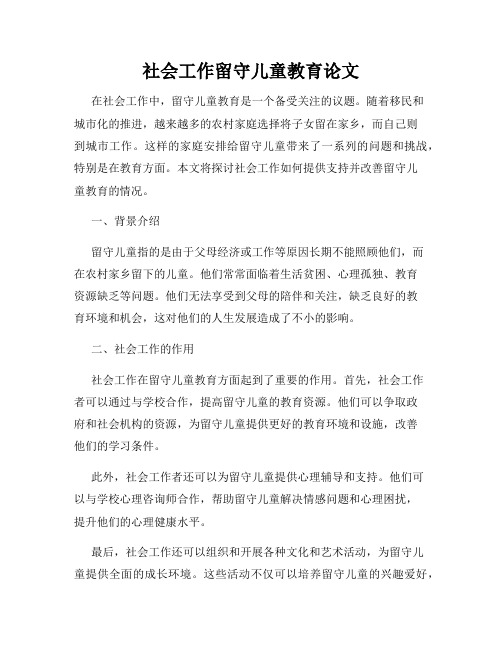
社会工作留守儿童教育论文在社会工作中,留守儿童教育是一个备受关注的议题。
随着移民和城市化的推进,越来越多的农村家庭选择将子女留在家乡,而自己则到城市工作。
这样的家庭安排给留守儿童带来了一系列的问题和挑战,特别是在教育方面。
本文将探讨社会工作如何提供支持并改善留守儿童教育的情况。
一、背景介绍留守儿童指的是由于父母经济或工作等原因长期不能照顾他们,而在农村家乡留下的儿童。
他们常常面临着生活贫困、心理孤独、教育资源缺乏等问题。
他们无法享受到父母的陪伴和关注,缺乏良好的教育环境和机会,这对他们的人生发展造成了不小的影响。
二、社会工作的作用社会工作在留守儿童教育方面起到了重要的作用。
首先,社会工作者可以通过与学校合作,提高留守儿童的教育资源。
他们可以争取政府和社会机构的资源,为留守儿童提供更好的教育环境和设施,改善他们的学习条件。
此外,社会工作者还可以为留守儿童提供心理辅导和支持。
他们可以与学校心理咨询师合作,帮助留守儿童解决情感问题和心理困扰,提升他们的心理健康水平。
最后,社会工作还可以组织和开展各种文化和艺术活动,为留守儿童提供全面的成长环境。
这些活动不仅可以培养留守儿童的兴趣爱好,提高他们的综合素质,还可以帮助他们扩大社交圈子,增加社会交往的机会。
三、案例分析以下是一个案例分析,展示了社会工作对留守儿童教育的积极影响。
小明,一个留守儿童,父母长期在外打工。
由于他们无法亲自照顾小明,他成为了留守儿童。
最初,小明在学校的学习成绩不佳,情绪也非常低落。
后来,学校根据社会工作者的建议,为小明提供了专门的心理辅导和支持。
社会工作者结合学校心理咨询师,帮助小明解决了他的心理问题,并提供了一系列的心理调适方案。
同时,社会工作者还组织了一系列的文化活动,例如绘画比赛、手工制作等,让小明在学校中找到了自己的兴趣爱好。
他不再感到孤独和无助,与同学们建立了良好的社交关系。
经过一段时间的努力,小明的学习成绩有了显著提高,情绪也逐渐稳定下来。
社会工作介入留守儿童论文

社会工作介入留守儿童论文社会工作介入留守儿童留守儿童是指在农村或城市中,由于父母外出务工、离异或其他原因而长期留在乡村、城乡结合部的儿童。
由于缺乏父母的陪伴和照料,留守儿童面临着许多困境和挑战。
为了解决这个社会问题,社会工作介入留守儿童的工作得到了越来越多的关注和重视。
本文将探讨社会工作在留守儿童问题上的角色和作用,以及相关的实践和挑战。
一、社会工作介入留守儿童的背景在中国,由于农村劳动力外出务工的潮流,越来越多的农村儿童不得不面对父母长期分离的现实。
留守儿童往往在家庭教育、心理健康、社交能力等方面存在着诸多问题。
社会工作作为一种专业化的实践和学科,致力于提供社会服务,并通过社会政策的制定和实施来改善个人和群体的福祉。
社会工作对于留守儿童问题的关注和介入,有助于为他们提供支持、资源和保护。
二、社会工作在留守儿童问题上的角色和作用1. 系统评估和干预:通过系统评估留守儿童的家庭状况、教育情况、心理健康等各个方面,社会工作可以为留守儿童提供个性化的干预服务。
这包括提供心理咨询、社交技能培训、学习辅导等,以增强他们的自我发展和适应能力。
2. 家庭支持和提供资源:社会工作可以帮助留守儿童的家庭获得社会资源和支持,提高他们的经济状况和生活质量。
通过社会工作的社会政策倡导和资金支持,可为留守家庭提供免费或低价的教育、医疗等服务。
3. 社区建设和网络建立:社会工作的另一个重要角色是促进社区的建设和发展。
社会工作者可以与社区成员、志愿者和其他相关机构合作,建立留守儿童关心和保护的网络,为留守儿童提供机会参与社区活动,培养良好的社交关系和归属感。
三、社会工作介入留守儿童问题的实践与挑战1. 实践案例:社会工作介入留守儿童问题的实践多种多样。
例如,某社会工作机构与当地教育部门合作,开展“快乐学习计划”,为留守儿童提供免费的学习资源和辅导。
另外,社会工作者还会与相关部门合作,开展家庭访问和评估,为留守儿童提供情感支持和指导。
社会工作介入农村留守儿童心理健康问题研究——基于生态理论视角
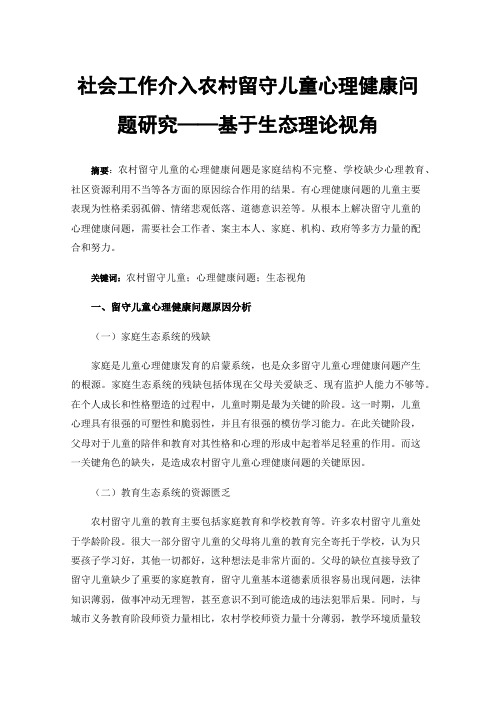
社会工作介入农村留守儿童心理健康问题研究——基于生态理论视角摘要:农村留守儿童的心理健康问题是家庭结构不完整、学校缺少心理教育、社区资源利用不当等各方面的原因综合作用的结果。
有心理健康问题的儿童主要表现为性格柔弱孤僻、情绪悲观低落、道德意识差等。
从根本上解决留守儿童的心理健康问题,需要社会工作者、案主本人、家庭、机构、政府等多方力量的配合和努力。
关键词:农村留守儿童;心理健康问题;生态视角一、留守儿童心理健康问题原因分析(一)家庭生态系统的残缺家庭是儿童心理健康发育的启蒙系统,也是众多留守儿童心理健康问题产生的根源。
家庭生态系统的残缺包括体现在父母关爱缺乏、现有监护人能力不够等。
在个人成长和性格塑造的过程中,儿童时期是最为关键的阶段。
这一时期,儿童心理具有很强的可塑性和脆弱性,并且有很强的模仿学习能力。
在此关键阶段,父母对于儿童的陪伴和教育对其性格和心理的形成中起着举足轻重的作用。
而这一关键角色的缺失,是造成农村留守儿童心理健康问题的关键原因。
(二)教育生态系统的资源匮乏农村留守儿童的教育主要包括家庭教育和学校教育等。
许多农村留守儿童处于学龄阶段。
很大一部分留守儿童的父母将儿童的教育完全寄托于学校,认为只要孩子学习好,其他一切都好,这种想法是非常片面的。
父母的缺位直接导致了留守儿童缺少了重要的家庭教育,留守儿童基本道德素质很容易出现问题,法律知识薄弱,做事冲动无理智,甚至意识不到可能造成的违法犯罪后果。
同时,与城市义务教育阶段师资力量相比,农村学校师资力量十分薄弱,教学环境质量较差,班级学生人数多,留守儿童常常被老师所忽视,并且学校也没有心理教育方面的课程内容。
因此学校教育对于留守儿童心理健康问题的矫正功能也比较薄弱。
(三)社会生态系统的负面影响除家庭、学校生活外,农村留守儿童通过社区环境来认识自己所生活的社会,并在心理上对社会形成初步的认识,进行早期的社会化。
农村社区在社会教育方面十分薄弱,教育资源匮乏,难以有效地弥补留守儿童家庭教育的缺失。
生态系统理论视角下农村留守儿童问题

汇报人: 日期:
目录
• 引言 • 生态系统理论概述 • 农村留守儿童现状及问题 • 生态系统理论视角下的农村留守
儿童问题分析 • 农村留守儿童问题的解决策略与
建议 • 结论与展望
01
引言
研究背景与意义
农村留守儿童问题是中国社会转型过程中的一个独特现象, 由于长期与父母分离,留守儿童面临着多种问题和挑战,如 教育、心理健康、安全等。生态系统理论为研究留守儿童问 题提供了新的视角和方法。
教育质量不高
农村地区的教育质量普遍 偏低,教学质量不高,导 致留守儿童在学习上存在 困难和问题。
心理辅导缺失
学校往往缺乏心理辅导老 师和专业人员,无法满足 留守儿童的心理健康需求 。
社会生态系统与留守儿童问题
社会支持不足
留守儿童在社会上得到的支持和 关注相对较少,缺乏社会的帮助
和支持。
社会歧视现象
优化学校教育环境
总结词
改善学校设施条件,提高教育质量,关注留守儿童的特殊需求。
详细描述
加强学校基础设施建设,提高教育质量,为留守儿童提供良好的学习环境和条件。同时,学校应该关注留守儿童 的特殊需求,建立完善的寄宿制度和生活照顾制度,为留守儿童提供更好的学习和生活保障。此外,学校还可以 通过开展各种活动和课程,丰富留守儿童的学习生活,提高他们的学习兴趣和积极性。
生态系统理论强调个人与环境的互动和相互影响,为研究农村
留守儿童问题提供了有力的理论框架。
研究不足与展望
研究方法与手段待完善
目前的研究方法和手段还比较单一,缺乏多学科、多维度的综合研究,需要进一步完善。
缺乏针对性政策建议
目前的研究成果还没有很好地转化为具有针对性的政策建议,需要加强这方面的研究和实 践。
生态系统理论视角下的农村留守儿童成长困境及社工介入路径分析

生态系统理论视角下的农村留守儿童成长困境及社工介入路径分析【摘要】农村留守儿童是我国社会发展过程中伴随着城乡人口迁移而出现的特殊群体。
受主客观因素的影响,他们的个人成长面临许多问题。
从生态系统理论的视角,从微观、中观和宏观三个层面分析农村留守儿童面临的成长困境,发现农村留守儿童面临的主要成长困境表现为:在微观系统中,心理问题严重,容易诱发越轨行为;在中观系统中,家庭结构不完整,学校支持不足,同伴交往存在错误倾向;在宏观制度上,受社会经济、政策和文化的制约,“污名”问题突出。
面对这些困境,社会工作应从微观、中观、宏观三个层面入手,采取多方位的干预策略,帮助农村留守儿童健康成长。
【关键词】生态系统理论;农村留守儿童;增长困境;社会工作者干预xdyxx . 2021 . 06 . 008一、问题的提出随着我国工业化、城市化水平的不断提高,农民逐渐成为我国社会流动的主体,大量农村剩余劳动力选择进城寻找更好的工作和生存机会。
但受我国户籍制度、家庭经济能力等各种主客观因素的影响,大多数农民工只能将孩子留在家乡由爷爷奶奶或其他亲属抚养,从而形成了——名农村留守儿童这一特殊群体。
近年来,在xx乡村振兴、脱贫攻坚和社会各界积极干预的背景下,我国农村留守儿童数量有所下降,但由于历史因素和现实情况,其规模仍然巨大。
根据《中国农村发展教育报告2019》,2017年我国农村留守儿童人数为1550.56万人[1]。
可以预见,作为我国城市化进程中的特殊群体,农村留守儿童在未来一段时间内还将继续存在,随之而来的各种问题也需要社会各界共同解决。
社会工作作为一种帮助他人帮助自己的专业服务,可以在帮助界定和解决农村留守儿童的教育和成长问题方面发挥积极作用。
2019年,民政部发布《关于进一步健全农村留守儿童和困境儿童关爱服务体系的意见》,强调“支持社会工作者、法律工作者、心理咨询工作者等专业人员,根据留守儿童和农村困境儿童的不同特点,提供心理咨询、家庭关爱、权利保护等服务”[2]。
社工留守儿童毕业论文

社工留守儿童毕业论文随着中国经济的快速发展,大量的留守儿童问题浮出水面。
留守儿童指的是父母长期在外务工,由家人或其他人代为照顾,而他们在城市或外地上学生活的群体。
留守儿童常因缺乏父母陪伴而面临诸多心理、认知和行为问题。
社工在关注这一群体的同时,也起到了重要的辅导和支持作用。
本文将从社工的角度分析留守儿童问题,并提出相应的解决方案和策略。
一、留守儿童的背景和现状从经济角度来看,中国长期以来都存在城市与农村之间的差距。
随着城市化进程的加速,大量的农民工逐渐离开家乡,到城市寻找更好的经济机会。
然而,由于经济压力和教育资源分配不均等等原因,他们往往无法将自己的孩子随之带到城市。
这就导致了大量儿童被迫留在农村,由亲戚或祖父母照顾。
留守儿童面临许多困境和挑战。
首先,他们缺乏父母的陪伴和关爱,无法享受到正常家庭生活所带来的情感支持。
其次,他们的教育资源有限,由于地理位置和经济条件的限制,他们常常只能就近就读较差的农村学校。
再次,他们面临着心理健康问题,如焦虑、抑郁和行为异常等。
最后,他们在成长过程中也面临着安全问题,容易受到欺凌、虐待和犯罪的威胁。
二、社工在留守儿童问题上的作用在解决留守儿童问题上,社工扮演着重要的角色。
首先,社工可以通过与留守儿童、家长和学校等相关方进行沟通和交流,了解他们的需要和问题。
其次,社工可以帮助留守儿童建立积极的情感支持网络,包括与其他留守儿童的交流和互助,以及与社区资源的连接。
再次,社工可以提供心理辅导和行为干预,帮助留守儿童克服他们面临的心理困难和行为问题。
最后,社工可以与学校合作,提供培训和指导,以促进留守儿童在学业和社交方面的发展。
三、解决留守儿童问题的策略和措施针对留守儿童问题,需要综合性的策略和措施。
首先,政府应加大对农村教育资源的投入,提高农村学校的教学质量和教育条件。
其次,政府和社会应加强对留守儿童的监护和保护,建立健全的法律制度和社会保障机制,保障他们的权益和安全。
生态系统理论对留守儿童研究的启示论文

生态系统理论对留守儿童研究的启示论文生态系统理论对留守儿童研究的启示论文摘要:留守儿童问题及其研究已经成为诸多学科的研究热点。
目前,存在留守儿童外延界定模糊、问题导向明显、忽视适应机制研究等问题。
生态系统理论强调儿童问题研究的生态性和系统性,强调儿童发展的可能性和适应性,强调留守儿童问题中儿童本身的主体因素研究。
受生态系统理论启示,留守儿童研究应在系统性和发展性的原则下进一步关注留守儿童的分型和分类,探索留守环境中儿童的适应保护机制以及歧视知觉、认知偏差、情绪认知、心理弹性等认知调节因素。
在实际留守儿童关爱工作中应以积极的、系统的、发展的眼光看待留守儿童,为留守儿童营造健康成长的留守心理环境。
关键词:留守儿童;生态系统理论;儿童发展;留守儿童(Left—behind Children)主要是对由于儿童双亲或单亲外出打工而造成的一种亲子离异现象的描绘[1]。
近年来,留守儿童数量急速增加,2010年留守儿童人数达到了7326万[2],其中6岁以下幼儿所占比例正在快速增加,占留守儿童总数的38。
37%[3]。
中国知网期刊数据库检索信息显示, 2009年之后留守儿童的研究成果也以每年7000余篇速度增加。
目前,大部分关于留守儿童的研究成果主要集中在对留守环境中儿童存在的危机和问题的描绘,是在问题导向下的留守现象研究。
这类研究将留守儿童作为一个特殊群体,描绘了其在家庭—学校—社会层面的诸多不利因素以及这些因素对留守儿童个性发展、行为、品行、身心健康等方面的影响。
问题导向的研究虽然为了解留守儿童心理发展特点和问题提供了大量的研究结果,但目前存在留守儿童概念界定模糊、问题导向主导具体研究、研究路径单一等问题。
一、留守儿童研究存在的问题1。
留守概念的界定模糊留守是一个复杂的社会现象,留守儿童更是复杂的、富于变化的、发展的有机个体。
在具体研究中,留守儿童往往被具体操作定义为父母双亲或单亲因外出务工而造成的亲子离异超过一年或半年的儿童。
留守儿童社会工作介入论文
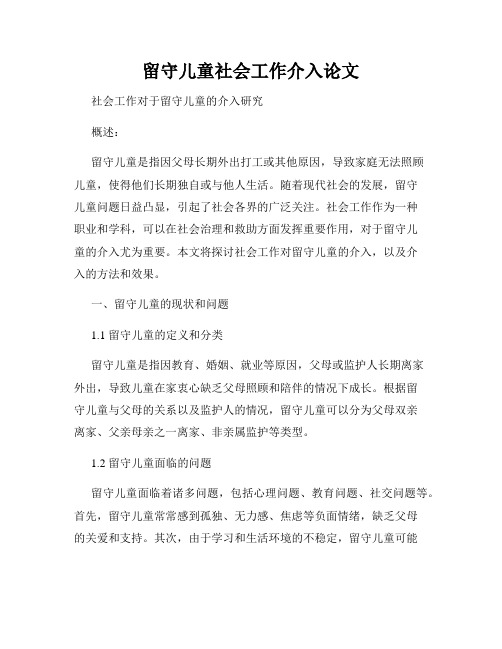
留守儿童社会工作介入论文社会工作对于留守儿童的介入研究概述:留守儿童是指因父母长期外出打工或其他原因,导致家庭无法照顾儿童,使得他们长期独自或与他人生活。
随着现代社会的发展,留守儿童问题日益凸显,引起了社会各界的广泛关注。
社会工作作为一种职业和学科,可以在社会治理和救助方面发挥重要作用,对于留守儿童的介入尤为重要。
本文将探讨社会工作对留守儿童的介入,以及介入的方法和效果。
一、留守儿童的现状和问题1.1 留守儿童的定义和分类留守儿童是指因教育、婚姻、就业等原因,父母或监护人长期离家外出,导致儿童在家衷心缺乏父母照顾和陪伴的情况下成长。
根据留守儿童与父母的关系以及监护人的情况,留守儿童可以分为父母双亲离家、父亲母亲之一离家、非亲属监护等类型。
1.2 留守儿童面临的问题留守儿童面临着诸多问题,包括心理问题、教育问题、社交问题等。
首先,留守儿童常常感到孤独、无力感、焦虑等负面情绪,缺乏父母的关爱和支持。
其次,由于学习和生活环境的不稳定,留守儿童可能面临教育资源匮乏、学业成绩下降的问题。
同时,由于缺乏家庭的监督和引导,留守儿童容易产生行为问题、人际关系问题等社交问题。
二、社会工作对留守儿童的介入2.1 社会工作的定义和职能社会工作是一种以人为中心的专业,旨在通过社会服务和社会公正来提升个人和社会的福祉。
社会工作的主要职能包括社会治理、社会救助、社区发展等。
2.2 社会工作介入留守儿童的意义社会工作对留守儿童的介入具有重要意义。
首先,社会工作可以提供情感支持和心理辅导,帮助留守儿童减轻心理压力和孤独感。
其次,社会工作可以提供教育支持,为留守儿童提供学习辅导、教育资源等。
此外,社会工作还可以帮助留守儿童建立健康的人际关系,提供社交支持和引导,促进他们的社会融合和发展。
三、社会工作介入留守儿童的方法和效果3.1 社会工作介入的方法社会工作对留守儿童的介入可以采用多种方法。
首先,社工可以建立留守儿童服务站点,提供咨询、心理辅导等服务。
生态系统理论下农村留守儿童生命教育研究

生态系统理论下农村留守儿童生命教育研究摘要:本文从当今农村留守儿童生命教育现状出发,分析农村留守儿童生命教育存在的问题,并在生态系统理论下,结合社会工作专业,从宏观层面的政策倡导、中观层面的群体教育、微观层面的个人发展提出解决策略。
关键词:农村留守儿童;生命教育;生态系统一、相关概念界定(一)生命教育生命教育不只是生死教育或死亡教育,而是全人教育,帮助生命个体探究生命的本质,从源头获得力量,学会运用正确的态度看待生命过程、直面生死,以实现自我人生价值的最大化。
依照台湾彩虹爱家生命教育协会的界定,我们可以从个体层面、他人层面、环境层面、生死层面四个维度来理解生命教育。
(二)生态系统理论生态系统理论认为人在情境中,把个体生活所处环境看作是社会性生态系统,对个体生活经验与成长有重要影响。
将个人问题社会化,重视社会系统与个人的交流互动。
结合农村留守儿童生命教育现状来看,可从宏观层面的政策倡导、中观层面的群体教育和微观层面的个人发展提出相应策略。
二、农村留守儿童生命教育开展存在的问题我国于2016年出台了《国务院关于加强农村留守儿童关爱保护工作的意见》,加强家庭、学校、社会力量、政府参与农村留守儿童关爱保护工作,为广大农村留守儿童创造健康成长的环境。
但是,目前我国农村留守儿童生命教育开展仍存在一定问题。
(一)个人资源方面的匮乏由于大部分留守儿童与上辈亲人生活在一起,缺乏家庭教育,学校也没有开设相关的课程,留守儿童对于生命意识的认识薄弱,缺乏生活经验和生活常识。
往往表现为在对死亡的认识上,受到传统观念中的避讳谈死,对死亡缺乏正确认识;在对自身的认识上,行动缺乏自信心,不能正确自身认识优缺点。
(二)社会资源方面的匮乏首先,在父母教育缺位情况下,留守儿童大多由其他亲属或朋友进行照顾,很难对其进行生命教育。
其次,学校对生命教育重视程度不够,与城市学校相比农村学校教学条件较差、设施设备不齐全、相关的生命教育课程体系不足,同时受到师资力量的限制,由专门老师开展生命教育难度较大。
留守儿童社会工作毕业论文

留守儿童社会工作毕业论文留守儿童社会工作摘要:本文主要探讨留守儿童在中国农村地区面临的问题以及社会工作者在解决这些问题中的作用。
首先介绍了留守儿童的定义和成因,随后详细分析了他们在教育、心理健康和社会适应等方面所面临的挑战。
接下来,论文探讨了社会工作者在帮助留守儿童方面的工作内容和方法,包括建立健全的支持体系、提供心理辅导和教育支持等。
最后,总结了当前留守儿童社会工作的挑战和展望。
1. 引言留守儿童的问题已经成为中国社会关注的焦点之一。
由于父母外出务工,留守儿童长期缺乏亲人陪伴,他们面临教育和心理健康等方面的困扰。
为了帮助他们健康成长,社会工作者在这一领域发挥了重要的作用。
2. 留守儿童的定义和成因留守儿童指的是由于其父母或亲属外出工作而长期与扶养人分离的儿童。
这种现象在农村地区尤为突出。
造成留守儿童问题的原因主要包括城乡经济发展不平衡、农村人口流失和缺乏社区支持等。
3. 教育挑战3.1 教育资源不足由于农村地区的教育资源匮乏,留守儿童往往无法享受到良好的教育条件。
他们可能无法上学或者只能上质量较差的学校,这严重影响了他们的学习成绩和发展。
3.2 学业进步受限留守儿童由于长期缺乏家庭教育,往往缺乏学习动力和纪律性,容易在学业上出现滞后和挫折感。
4. 心理健康问题4.1 孤独感和焦虑留守儿童长期缺乏父母的陪伴,容易产生孤独感和焦虑情绪,严重影响他们的心理健康。
4.2 自尊心受挫缺乏家庭关爱和重视,留守儿童易产生自尊心受挫的问题,甚至对自己的成长和价值产生怀疑。
5. 社会适应问题5.1 人际交往困难长期与扶养人分离,留守儿童缺乏良好的社交经验,往往在与同龄人的交往中出现困难。
5.2 价值观困惑父母长期不在身边,留守儿童缺乏正确的家庭教育,容易产生价值观困惑,对社会规范和行为规范缺乏清晰的认识。
6. 社会工作者在解决问题中的作用6.1 建立健全的支持体系社会工作者可以与学校、社区和家庭等建立良好的合作关系,共同为留守儿童提供支持和帮助。
- 1、下载文档前请自行甄别文档内容的完整性,平台不提供额外的编辑、内容补充、找答案等附加服务。
- 2、"仅部分预览"的文档,不可在线预览部分如存在完整性等问题,可反馈申请退款(可完整预览的文档不适用该条件!)。
- 3、如文档侵犯您的权益,请联系客服反馈,我们会尽快为您处理(人工客服工作时间:9:00-18:30)。
生态系统理论视角下农村留守儿童问题研究
【摘要】农村留守儿童是伴随着城市化和工业化进程而出现的特殊困难群体,由于父母角色的缺位、家庭结构的不完整、学校教育资源匮乏、社区文化建设低下等,他们的留守生活面临着一系列的问题。
本研究在生态系统理论的指导下,通过对农村留守儿童群体以及农村留守儿童服务提供者进行调查,评估了农村留守儿童在家庭系统、学校生活、社区和社会文化中的生活现状,并尝试指出其生活系统中所存在的问题,其中,包括微观系统中的思想道德、教育学习、心理健康、安全隐患问题,中观系统中的家庭教育、同辈群体、学校教育问题,宏观系统中的社会文化、社会服务问题,且在此基础上提出了不同层次的社会工作介入方案。
【关键词】生态系统理论农村留守儿童社会工作
Research on Left-behind Children in Rural Areas from the Perspective of Ecosystem Theory
[Abstract] Left-behind children in rural areas are special group that appear with the process of urbanization and industrialization in China. Life of left-behind consist of a series of problems due to the absence of parental roles, the incomplete family structure, the lack of educational resources in schools, and the low cultural construction in communities. Following the principle of ecological system theory, questionaire survey of left-behind children and related service providers were conducted in current study. Status and problems of family, school, community, social and cultural system, among rural left-behind children were also evaluated. Life system of left-behind children can be divided into three levels: the micro system of ideological and moral, education, psychological health, safety in micro level; family education, peer groups, school education in medium level; and social culture and social services in the macroscopic level. At last, different levels of intervention from social work perspective was illustrated.
[Keywords] Ecosystem theory; Left-behind children in rural areas; Social work
目录
一、前言 (5)
1.1 研究背景与意义 (5)
1.2 相关概念界定 (6)
1.2.1 农村留守儿童 (6)
1.2.2 生态系统理论 (6)
二、文献分析 (8)
2.1 国外研究现状 (8)
2.2 国内研究现状 (8)
三、研究思路与方法 (11)
3.1 问卷调查 (11)
3.2 参与式观察法 (11)
3.3 文献分析 (11)
四、农村留守儿童综合状况调查和分析 (12)
4.1 个体系统特征 (12)
4.1.1 心理现象方面 (12)
4.1.2 性格状况 (13)
4.1.3 越轨行为 (14)
4.2 家庭系统特征 (14)
4.2.1 兄弟姐妹的数量 (14)
4.2.2 亲子关系 (15)
4.2.3 抚养方式 (15)
4.2.4 教育态度 (16)
4.3 学校生活系统特征 (16)
4.3.1 学校学习 (16)
4.3.2 人际交往 (17)
4.3.3 教学方式 (18)
4.4 社区和社会文化系统特征 (18)
4.4.1 父母情感关系 (18)
4.4.2 社会帮助 (19)
五、农村留守儿童成长主要问题分析 (21)
5.1 微观系统 (21)
5.1.1 思想道德问题 (21)
5.1.2 教育学习问题 (21)
5.1.3 心理健康问题 (22)
5.1.4 安全隐患问题 (22)
5.2 中观系统 (23)
5.2.1 家庭教育问题 (23)
5.2.2 同辈群体问题 (23)
5.2.3 学校教育问题 (24)
5.3 宏观系统 (25)
5.3.1 社会文化问题 (25)
5.3.2 社会服务问题 (25)
六、解决问题的思路与对策 (27)
6.1 农村留守儿童微观系统层面的社会工作介入 (28)
6.2 农村留守儿童中观系统层面的社会工作介入 (28)
6.3 农村留守儿童宏观系统层面的社会工作介入 (29)
七、结论 (30)
参考文献 (31)
致谢 (34)
附录1 关于农村留守儿童生活现状的调查问卷 (35)
附录2 关于农村留守儿童服务情况的调查问卷 (38)
一、前言
1.1 研究背景与意义
自中国改革开放以来,国民收入不断提高,物质生活日渐丰富,工业化进程与城镇化进程加快,大量农村青壮年劳动力迫于生存压力向城市转移,导致出现了进城务工人员与其子女分居两地的现实困境。
作为二元体制下的弱势群体——农村留守儿童缺少父母的陪伴,在孤独地成长着。
2007年,政府强调务必要关心农村留守儿童各个方面的问题,提供有效的保障措施并建立相应的管理制度,以达到农村留守儿童健康成长、父母安心打工的目的,这标志着政府已将农村留守儿童问题纳入政府部门的相关议程。
近年来我国农村留守儿童数量呈现较大幅度下降,截止到2019年,我国农村留守儿童仍有1550万,相比2013年减少了5000万。
虽然当前农村留守儿童数量呈现下降趋势,但农村留守儿童问题作为一个社会问题依然引起了政府和社会的广泛关注。
农村留守儿童问题的缓解或解决,对该群体正确应对儿童期和青少年期危机、家庭系统协调运转、建设和谐农村社会以及提升农村居民社会福利水平均具有重要的作用。
由于家庭结构不完整所带来的亲情缺失,农村留守儿童出现了一定的心理、教育和安全问题,同时由于各种不利结构的交织和可利用的资源匮乏,农村留守儿童面临着严重的不利情势。
农村留守儿童的问题不只是“留守”所造成的问题或“留守儿童”自身的问题,而是与更广泛、更深层的社会环境关联在一起的问题,任何试图讨论农村留守儿童问题的研究,都必须将其置身于社会系统及其子系统之中,否则无法获得对农村留守儿童的正确认识。
本研究将以农村留守儿童为研究对象,通过生态系统理论的视角,对实地调研中发现的农村留守儿童的现状以及所面临的各种成长问题进行分析,尝试从微观系统、中观系统、宏观系统三个层次提出社会工作介入方法,讨论提供专业服务的途径。
本研究的研究意义有包括:第一,对农村留守儿童而言,实现增能赋权、更好地掌握应对生活困境的技巧,从而更加健康地成长、更好地实现全人发展。
第二,对留守家庭而言,恢复家庭功能,父母掌握正确的教育技能与沟通技巧,发挥父母对孩子的正确引导作用,提高亲子关系的和谐度以及家庭幸福感。
第三,对社会而言,缓解或解决社会问题,消除社会上的不安因素,提供高素质。
